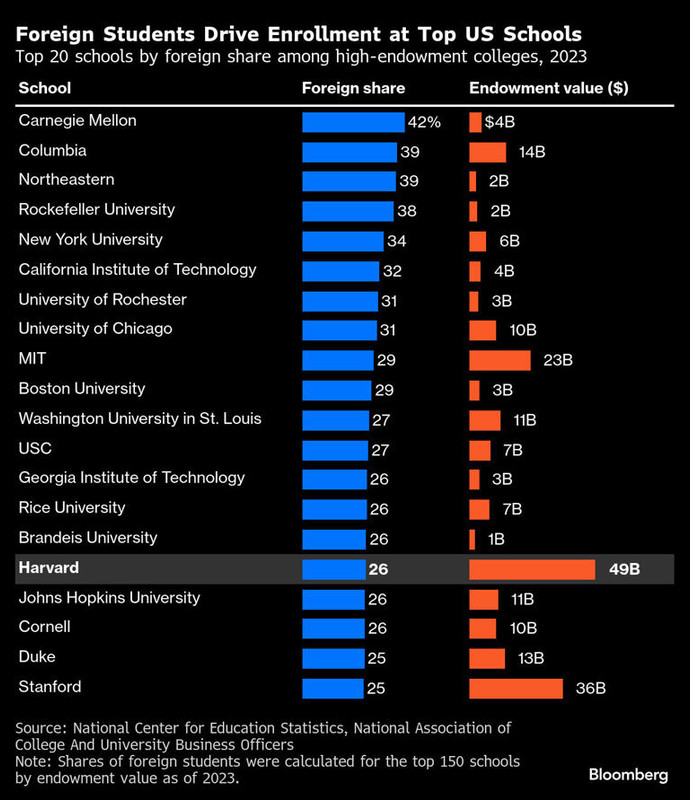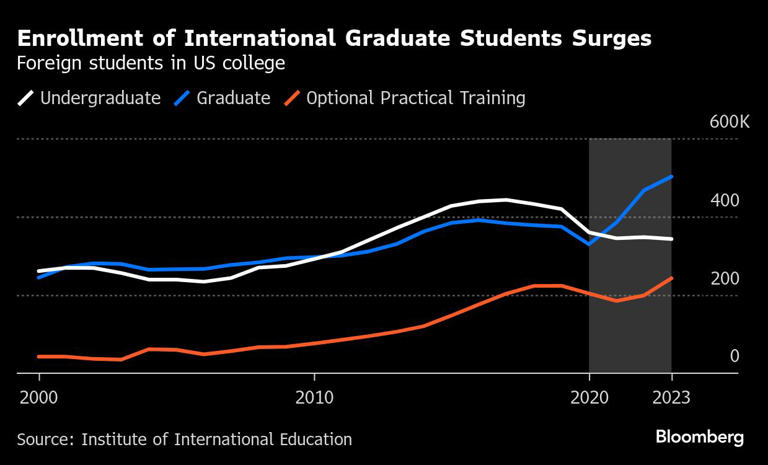(Bloomberg) -- For Lloyd Blankfein, Harvard University’s appeal to foreign students is inextricably linked to its national identity.
“It is an American institution that attracts foreigners precisely because it is an American university,” the former Goldman Sachs Group Inc. chief said in an interview, echoing a message he delivered to the school’s president last year. Blankfein had urged it to prepare for a coming attack, warning that if Harvard failed to define itself as a distinctly American force working for the public good, its detractors would advance a crippling counter-narrative.
Almost a year on, the White House is doing just that.
It’s casting Ivy League universities as ideologically biased against conservative values, tolerant of antisemitism and focused on promoting ideas favored by a global elite at the expense of US interests. And President Donald Trump, in a series of moves targeting the finances of brand-name colleges, is bringing his protectionist “America First” campaign to bear on those educational institutions.
His latest actions on this front have focused on foreign students: The administration last week sought to revoke Harvard’s ability to enroll them, and has ordered US embassies worldwide to stop scheduling visa interviews for applicants. The US will also begin revoking the visas of Chinese students, including those with connections to the nation’s ruling communist party or studying in critical fields, Secretary of State Marco Rubio said on Wednesday evening.
A major drop in students from overseas, who typically pay full price, would devastate higher education from the Ivy League to large state schools and tiny liberal arts colleges. But the richest and most prominent American institutions would be hit hardest.

House Republicans passed a bill this month that included a steep increase to the tax on endowment funds. A change in how the levy is calculated would penalize wealthy schools with a high number of foreign students.
International students make up 15% of the 150 colleges with the largest endowments — a much higher concentration than the rest of US colleges overall, according to a Bloomberg analysis of federal data from the 2022-23 academic year. At Columbia, nearly 40% of undergraduate and graduate students are from overseas, while they account for around 25% at Harvard, Cornell, Duke and Stanford.
Blankfein views the move to ban foreign students at Harvard as part of a broader ideological campaign by the Trump administration to put financial pressure on his alma mater.
“It’s just another lever to bring Harvard to heel,” he said. “If the administration could shut off electricity and water to Harvard, it probably would.”
While schools including Columbia and Cornell are being pressured by the administration, it has zeroed in on Harvard as a primary target for attack. The White House has suspended more than $2.6 billion in federal research money to the Cambridge, Massachusetts-based university and said the college won’t be able to receive new funding.
Trump has also repeatedly called for Harvard to lose its tax-exempt status. On Tuesday, his administration moved to cancel all remaining federal contracts to the richest and oldest US university, which was founded almost 400 years ago and now boasts a $53 billion endowment.
The school has sued the government over the cuts to funding as well as the ban on enrolling international students, on which it received a temporary reprieve from a judge on Friday.
“Harvard has to understand the last thing I want to do is hurt them. They’re hurting themselves. They’re fighting,” Trump said on Wednesday at the White House, adding that he wants the school to cap the share of foreign students at about 15%.
“We have people who want to go to Harvard and other schools,” he said. “They can’t get in because we have foreign students there.”
Budget Squeeze
US universities have reacted to the financial pressure by curbing spending and cutting back on some research projects. But a blockade on international students risks fundamentally changing the nature of American higher education, both because of the hit to their budgets and also the make-up of the student population.
“Many institutions depend on international students, not only for the global perspective they bring to campus but also for the financial stability,” said Daniel Pierce, a partner at law firm Fragomen who works on immigration law cases. “These universities now face a difficult choice: respond rapidly to significant government demands or prepare for court battles.”
It would also have repercussions far beyond academia. Most international students pursue STEM degrees and go on to seek authorization to work in the US, landing jobs on Wall Street, in Silicon Valley and across other industries. There are at least 55 people within the ranks of the world’s 500 richest who were born outside the US and attended an American university, according to the Bloomberg Billionaires Index, including Elon Musk and John Collison, the founder of digital payments firm Stripe.
Former Reserve Bank of India Governor Raghuram Rajan, now a professor of finance at the University of Chicago Booth School of Business, warned that the Trump administration’s policies risk eroding the advantage that foreign students have brought to US innovation and economic leadership.
International students have done “wonders for the US economy,” Rajan said in an interview with Bloomberg TV on Wednesday. “To some extent, the problem is the universities haven’t made the case that they are so central to US growth, but also central to the distribution of that growth.”
The number of international students at US colleges, which dipped during the pandemic, rebounded to an all-time high in the 2023-24 school year, with a 23% surge in students coming from India. Most receive no financial aid from their schools. Around 86% of undergraduates and nearly two-thirds of graduate foreign students paid out of pocket using personal or family funds, according to the Institute of International Education.
The Trump administration argues that the universities aren’t doing enough to vet and monitor the international students it admits. Homeland Security Secretary Kristi Noem has said that Harvard’s responses to the government’s requests to provide information about misconduct by foreign students were insufficient.
“I want to make sure that the foreign students are people that can love our country,” Trump said Wednesday.
He has also signaled that other less-wealthy American universities can take up the mantle on higher education in the US. The president earlier this month praised the University of Alabama while delivering a commencement speech.
“The next chapter of the American story will not be written by the Harvard Crimson. It will be written by you the Crimson Tide,” he said, referring to the college’s nickname.
Still, his administration’s hardline approach puts it at odds with some of the Republican party’s high-profile backers. Citadel founder Ken Griffin, a major donor to Harvard and the GOP, said in May that international students should get visas when they earn their degrees. And Musk has been a defender of H-1Bs, saying in an X post in December that there is a “dire shortage of extremely talented and motivated engineers in America.”
International students, or those on F-1 visas, received more than half of 360,000 H-1B visas issued from 2020 to 2023, according to federal data.
These students spent $56 billion last year attending US colleges, according to the US Bureau of Economic Analysis. Most advanced degree holders from India and China choose to stay and work in the US, often for tech companies.
Global Talent
Many foreign students also obtain a temporary work authorization called Optional Practical Training, or OPT. Companies hired more than 240,000 OPT holders in the 2023-2024 academic year, up 22% from the year before, according to the Institute of International Education. By contrast, the main work visa program for college graduates, H-1B, is capped at 85,000 slots each year.
“What we’re doing is halting that pipeline,” said Miriam Feldblum, the chief executive officer of the Presidents’ Alliance on Higher Education and Immigration. “These are clear messages that undermine our status as the premier destination for global talent.”
International students account for nearly 6% of the total US higher education population, federal data shows. Following the pandemic, more foreign students enrolled in graduate programs than undergraduate and now make up nearly 18% of all graduate students — the highest share in a decade.

Even before the actions against Harvard, college counselors across the country were urging international students to search for universities outside of the US as a Plan B.
Nat Smitobol, a college counselor at IvyWise, said that he has even advised his nephew in Thailand to cancel his plans of going to the US. Leelila Strogov of AtomicMind encouraged all her international students apply to colleges outside the US as a contingency plan.
Like in other policy areas, Trump’s moves around immigrant students are upending US norms.
As recently as November 2024, a State Department official praised international students for helping shape the “future of our interconnected world.” It’s a sentiment shared by Blankfein, who rose to the pinnacle of Wall Street, criss-crossing the globe during his 12-year reign atop Goldman Sachs.
“It’s of tremendous benefit to America that our great universities draw the smartest young people from around the world,” he told Bloomberg. “When you roll the clock forward and these foreign students take on top jobs in government, academia and business in their home countries, they will have firsthand appreciation for us and our values, and relationships with classmates similarly positioned in the States.”
--With assistance from Craig Giammona, Pierre Paulden and Eric Fan.
